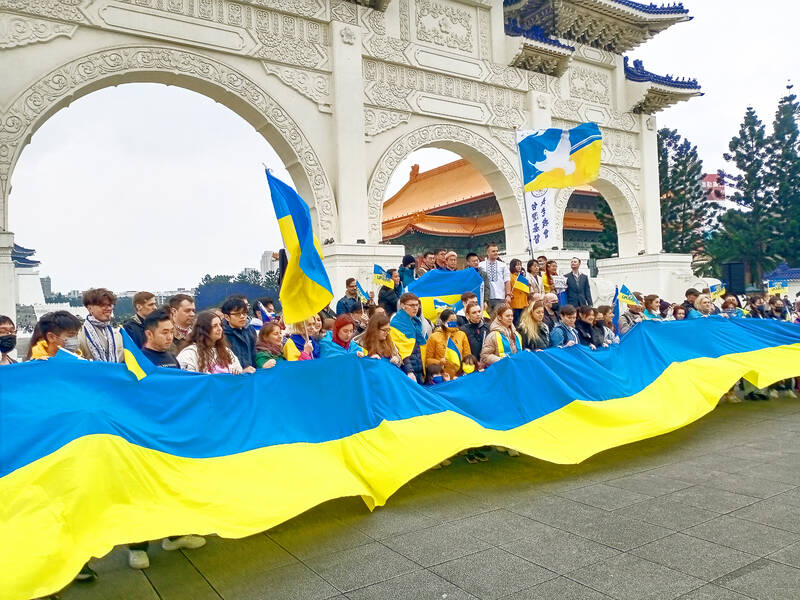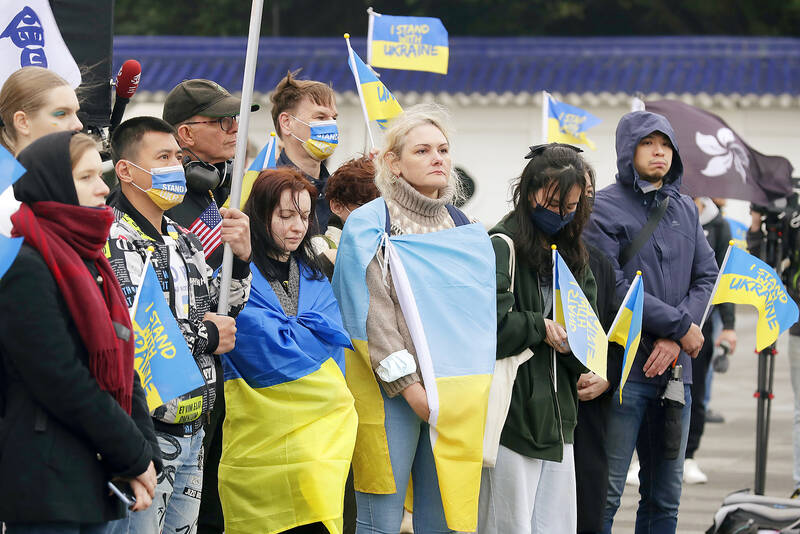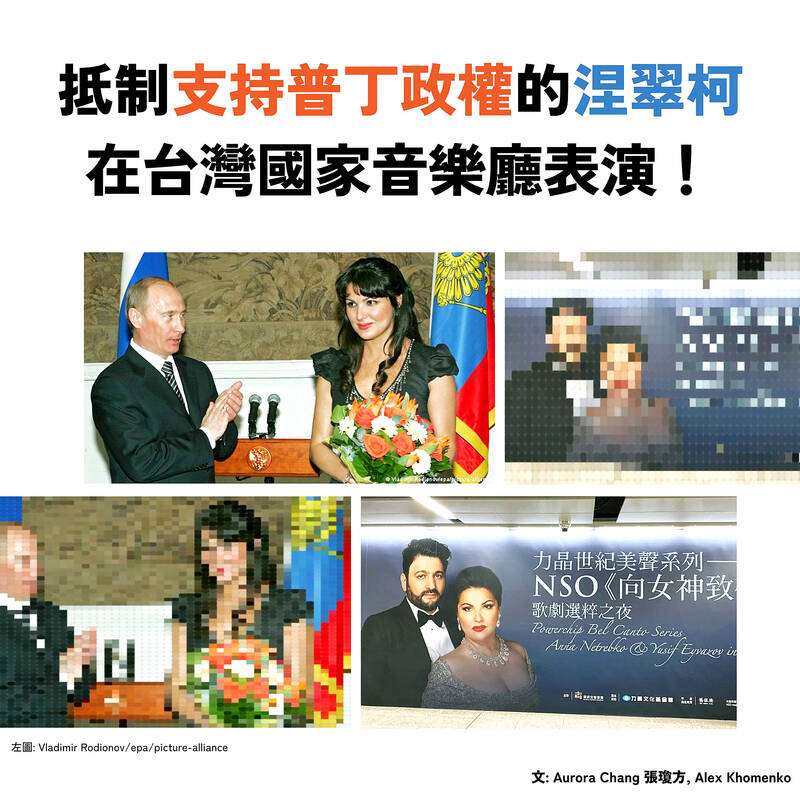Ukrainians are nothing if not determined. The Russian invasion of their country and atrocities against its population has made that clear. Taiwan’s small Ukrainian community and its supporters have also demonstrated their doggedness this week through a campaign to have a performance by a pro-Putin opera singer canceled.
Following a sustained social media and e-mail campaign involving volunteers from the nongovernmental organization Taiwan Stands With Ukraine (TSWU, 台灣烏克蘭陣線), the National Symphony Orchestra agreed to call off a concert by Russian soprano Anna Netrebko set for March 5 at National Taiwan Concert Hall.
The cancellation came just hours after the NSO had issued a statement justifying its decision to book Netrebko, who — until it started to jeopardize her career — was fawning in her support for Russian President Vladimir Putin. Ahead of the 2018 presidential elections in Russia, Netrebko said it was “impossible to think of a better president for Russia” having previously gushed over his “strong, male energy.”

Photo: James Baron
She was also infamously pictured wearing a t-shirt emblazoned with the Russian words for “To Berlin.” This could be taken as a reference to Russia’s victory over Germany in World War II, but also as indicating a desire for Putin to extend his war in Ukraine westward.
“It signifies the Russian army shouldn’t stop until it reaches Berlin,” say Yulia Maksymova, a Ukrainian resident of Taipei who helped propel the campaign.
“Oh, it’s definitely understood as the future tense, not the past,” says Alex Khomenko an organizer with TSWU. “Just your light imperialist invasion humor. You know how Russia rolls.”

Photo: AP
After having performances canceled at venues throughout the world, Netrebko finally spoke out against the war, in what critics say is simply a bid to salvage her career. Pointedly refusing to condemn Putin, she has attempted to create some distance by saying she has met him just a few times on ceremonial occasions.
Having featured on a list of high-profile endorsers for Putin’s return to the presidency in 2012, Netrebko claimed she had not voted in the 2018 election. Yet any doubts over the cosiness of her relationship with Putin were dispelled by a concert to celebrate her 50th birthday at the State Kremlin Palace in September 2021. Speaking at the event, Putin’s press secretary read out a Telegram from Putin in which he praised Netrebko for her “uplifting personality and a clear-cut civic stance.”
SUPPORT FOR SEPARATISTS

Photo courtesy of Aurora Chang
But by far the most obvious reason of why she should never have been considered an appropriate choice for the NSO in the first place is her 2014 appearance with separatist leader Oleg Tsaryov at the Donetsk opera house. During a press event, which came just months after Russian annexation of Crimea, Netrebko and Tsaryov held up a flag for the breakaway region of “Novorossiya.”
“This was just after the Russians shot down that airliner [Malayasia Airlines Flight 17 in July 2014],” says Maksymova. “So anyone who was aware of what was happening in the international arena should be thinking twice before getting into the insidious company of those people. She was not an innocent little girl.”
DECENTRALIZED APPROACH
The campaign was kickstarted after Maksymova and friends chanced upon a banner advertising the performance outside the National Concert Hall on Saturday during a TSWU event to mark the first anniversary of the Russian invasion.
“At first we didn’t register,” she says. “But when we realized it was her, we were mortified.”
Maksymova describes the way in which people were quickly galvanized into action as “typically Ukrainian” in that it was more of an organic, decentralized approach than top-down decision-making.
“Before the war, I hardly knew any Ukrainians in Taiwan and wasn’t particularly interested in reaching out because I was living my own life,” she says.
Maksymova compares the process to bees fulfilling their everyday tasks with little interest for what their fellows are up to.
“It only becomes one directed, effective mass when all the bees start working together as one organism driven by a particular aim.”
There was certainly some method to the frenzy of action after group chat discussions among Taiwan’s Ukrainians on how best to proceed. Activists and organizers with TSWU began sharing news across social media and soon local news networks were picking up on the story.
TIPPING POINT
“It was a community effort,” says Aurora Chang (張瓊方), another organizer with TSWU. Following rapid dissemination of the initial posts and tweets by Maksymova, Khomenko, and others, Chang noticed there hadn’t been much traction in Mandarin. She contacted Taiwan Association of Human Rights Secretary General Shih Yi-hsiang (施逸翔) for his input “since he’s such a prominent figure in Taiwan’s human rights circles.”
Shih posted on the subject, extending the reach of the protests to those who might not normally have come across it. Chang then put together an eye-catching composite infographic featuring images of Netrebko that made plain the singer’s stance, and explanations in Chinese, which also quickly circulated.
Soon TV networks were involved, with TVBS interviewing Ukrainians and TSWU figures. Initially the NSO responded by noting that Netrebko had spoken out against the war and had since performed in Europe — a justification that was dismissed as a cop-out. However, an e-mail campaign, which Khomenko guesses ran into the dozens, piled on the pressure. Then, with Democratic Progressive Party Legislator Wang Ting-yu (王定宇) and the Ministry of Culture weighing in, a tipping point appears to have been reached.
The speed at which things had escalated surprised many. “I’ll be honest: I didn’t see that coming. It was awesome to see real action so quickly,” says Khomenko.
“That’s the beauty of it,” says Maksymova. “We’re not waiting for someone to create a series of steps. It works organically and each of us brings our own contribution to the table.

That US assistance was a model for Taiwan’s spectacular development success was early recognized by policymakers and analysts. In a report to the US Congress for the fiscal year 1962, former President John F. Kennedy noted Taiwan’s “rapid economic growth,” was “producing a substantial net gain in living.” Kennedy had a stake in Taiwan’s achievements and the US’ official development assistance (ODA) in general: In September 1961, his entreaty to make the 1960s a “decade of development,” and an accompanying proposal for dedicated legislation to this end, had been formalized by congressional passage of the Foreign Assistance Act. Two

Despite the intense sunshine, we were hardly breaking a sweat as we cruised along the flat, dedicated bike lane, well protected from the heat by a canopy of trees. The electric assist on the bikes likely made a difference, too. Far removed from the bustle and noise of the Taichung traffic, we admired the serene rural scenery, making our way over rivers, alongside rice paddies and through pear orchards. Our route for the day covered two bike paths that connect in Fengyuan District (豐原) and are best done together. The Hou-Feng Bike Path (后豐鐵馬道) runs southward from Houli District (后里) while the

March 31 to April 6 On May 13, 1950, National Taiwan University Hospital otolaryngologist Su You-peng (蘇友鵬) was summoned to the director’s office. He thought someone had complained about him practicing the violin at night, but when he entered the room, he knew something was terribly wrong. He saw several burly men who appeared to be government secret agents, and three other resident doctors: internist Hsu Chiang (許強), dermatologist Hu Pao-chen (胡寶珍) and ophthalmologist Hu Hsin-lin (胡鑫麟). They were handcuffed, herded onto two jeeps and taken to the Secrecy Bureau (保密局) for questioning. Su was still in his doctor’s robes at

Mirror mirror on the wall, what’s the fairest Disney live-action remake of them all? Wait, mirror. Hold on a second. Maybe choosing from the likes of Alice in Wonderland (2010), Mulan (2020) and The Lion King (2019) isn’t such a good idea. Mirror, on second thought, what’s on Netflix? Even the most devoted fans would have to acknowledge that these have not been the most illustrious illustrations of Disney magic. At their best (Pete’s Dragon? Cinderella?) they breathe life into old classics that could use a little updating. At their worst, well, blue Will Smith. Given the rapacious rate of remakes in modern